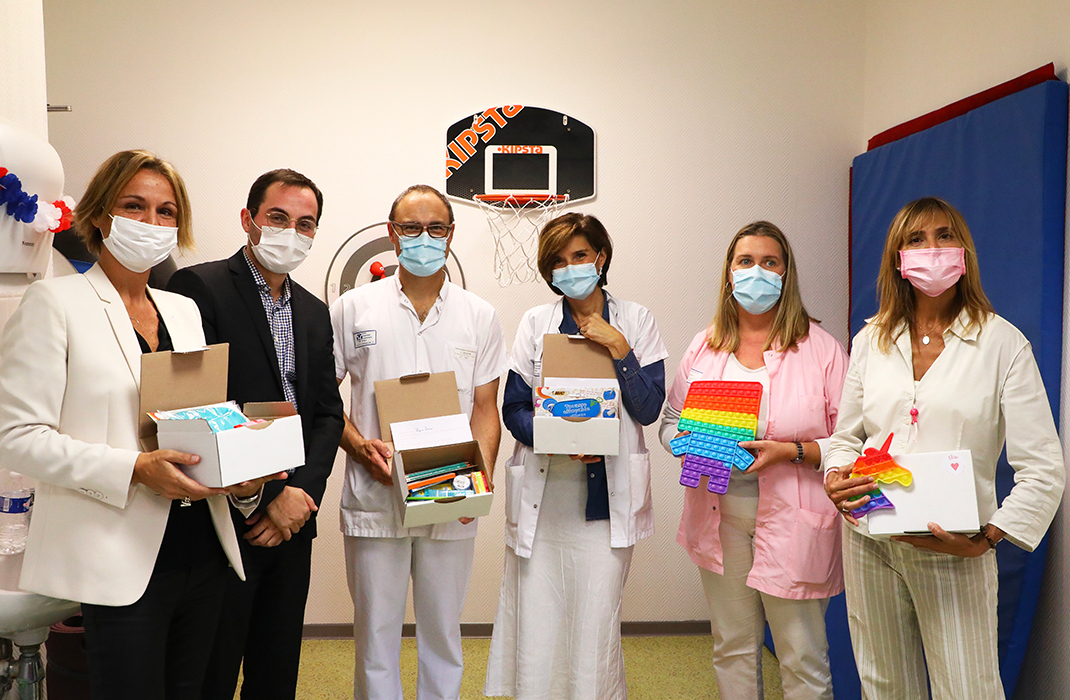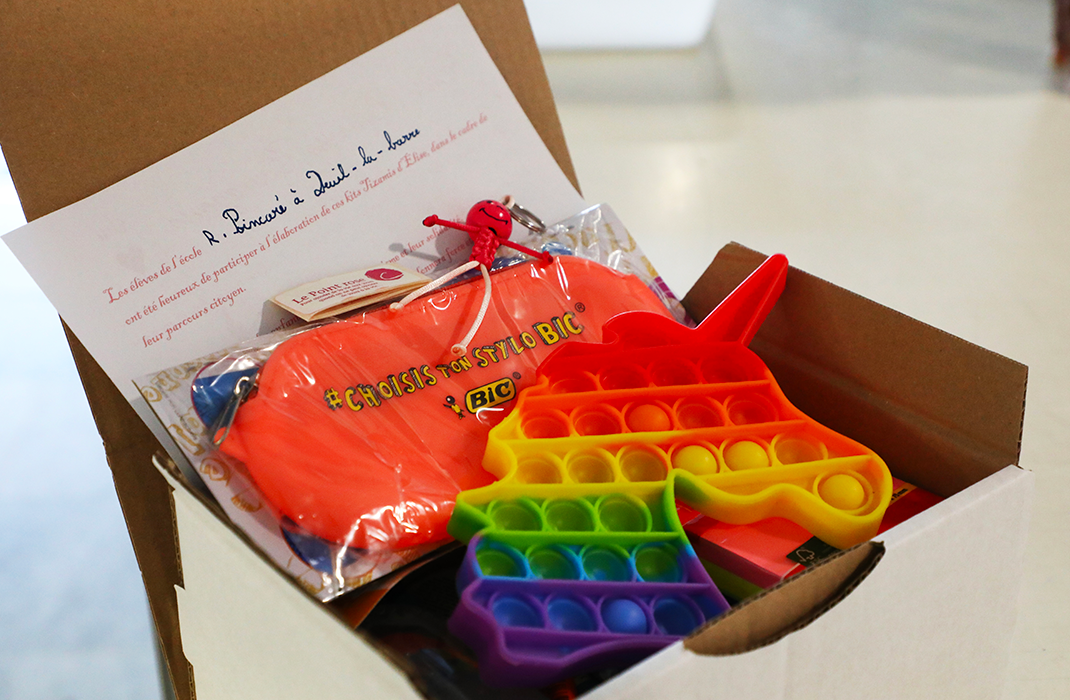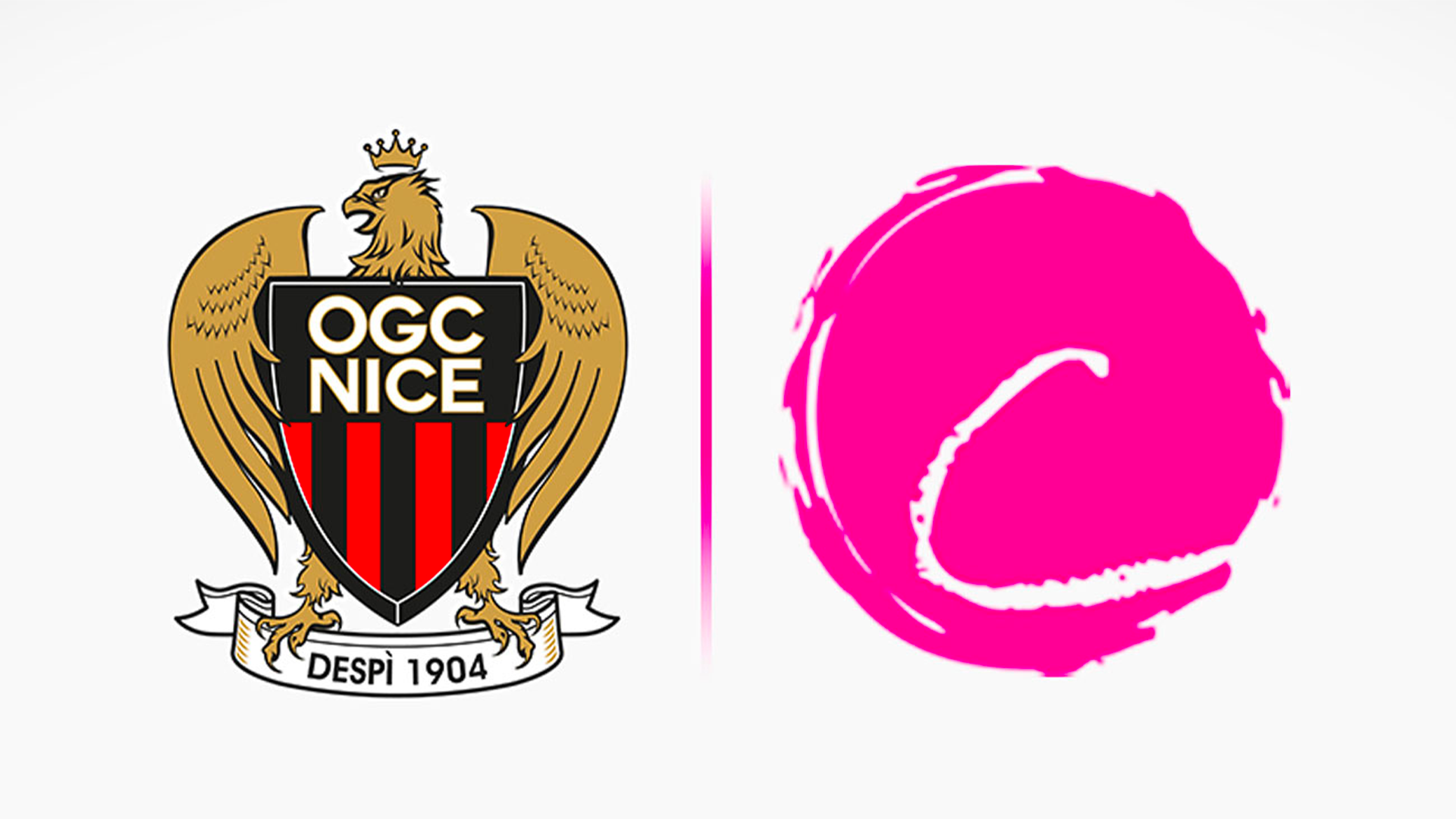
Point rose
Nathalie Paoli: "Some great projects to come with OGC Nice"
As part of its social policy, OGC Nice has supported Le Point rose association since 2015/16. Nathalie Paoli - the founder of the association, which aims to support seriously ill children and their families - looks back on six years of working with Le Gym and what is to come.
Nathalie, can you present Le Point rose and its origins?
Le Point rose is an association created in October 2015 and is born out of great sadness, the death of my daughter from a brain tumour in February that year. That event brought home to us the lack of support - not medical but personal - especially in the final weeks. We got the impression that everyone had already moved on a little bit, that there was nothing left to do and that we were waiting for her to go. After she passed, we got the feeling things were moving on while we, as parents, were standing still. That's what most families experience. I was surprised by how little support there is to cope with that. We live in a country where there is a lot of solidarity, but the death of a child makes people so afraid that there is nothing, or that there's a sort of belief that you can't get over that. Those sorts of situations end in desperation, the parents are consumed by grief, which can become pathological, not by nature, but because no one did anything about it.
So, it's to fill that void that you founded Le Point rose?
We did it with the aim of improving palliative care and the support network for families, siblings, schools, and all those impacted by a child's terminal illness. At the same time, we developed all the support systems a family who has lost a child could need and help them find the resources to move forward. Initially to survive and then to perhaps even become better than they were before.
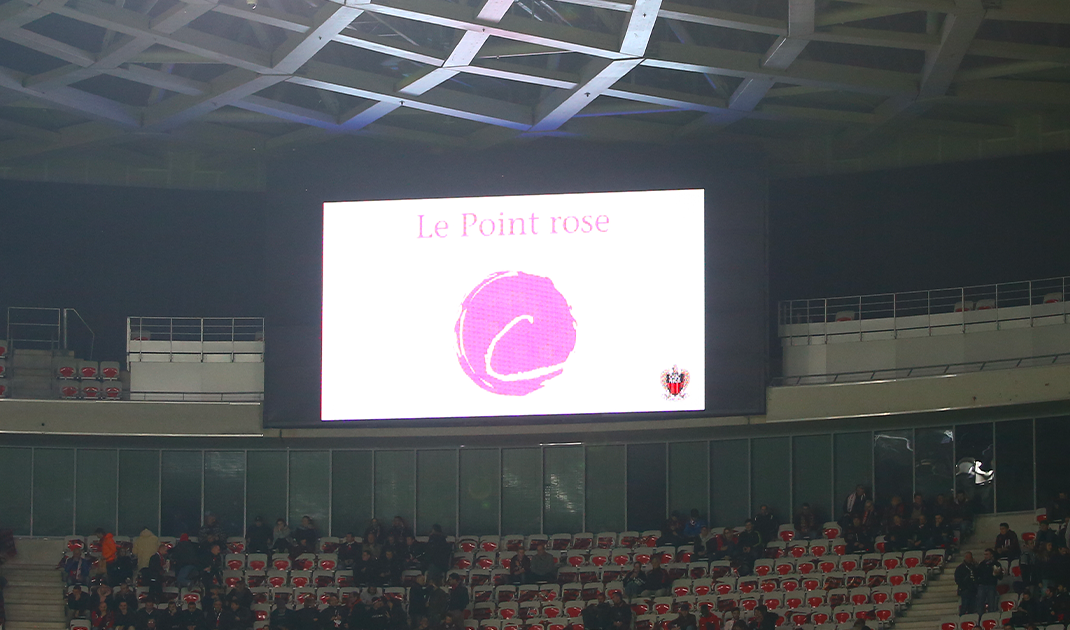
How has the association developed over the last six years?
At the start, the association was really to support terminally ill children, and then we were contacted by families who had already lost a child and we were confronted with the grief of the siblings, parents and grand parents. We were also contacted by parents who'd lost their child in other circumstances (accident, attack, birth…). The fact that we're specialised in the loss of a child, regardless of age or cause of death, was not the association's initial goal. We have developed, and it's sad to say because we'd prefer not to have needed to, a real expertise in supporting those grieving for a child whose death has been brutal, when it's linked to illness, still birth…
I've also undergone training to be more legititmate in helping families. I trained in support counselling for the death of a child and also in palliative care. Because I wanted to understand how palliative care is taught and put into practice and its specifics regarding pediatrics. When we created the association, I had the legitimacy of experience and to be able to talk about it. It's true that experience is something you cannot replace. In spite of everything, losing a child or supporting an ill child is always a unique story and I quickly understood that we understood each other and that we had an obvious bond, but that what helped me didn't necessarily help another parent. Today, a lot of parents contact me without knowing that I have gone through what they are going through and I think it's great the association has lasted.
We also work with therapists and professional partners, psychologists, doctors, oncologists, art-therapists, sophrologists, sports coaches…We have a real professional team, which is committed. They have a special sensitivity to the stories of the child and the families that we support, which means that we work with them.
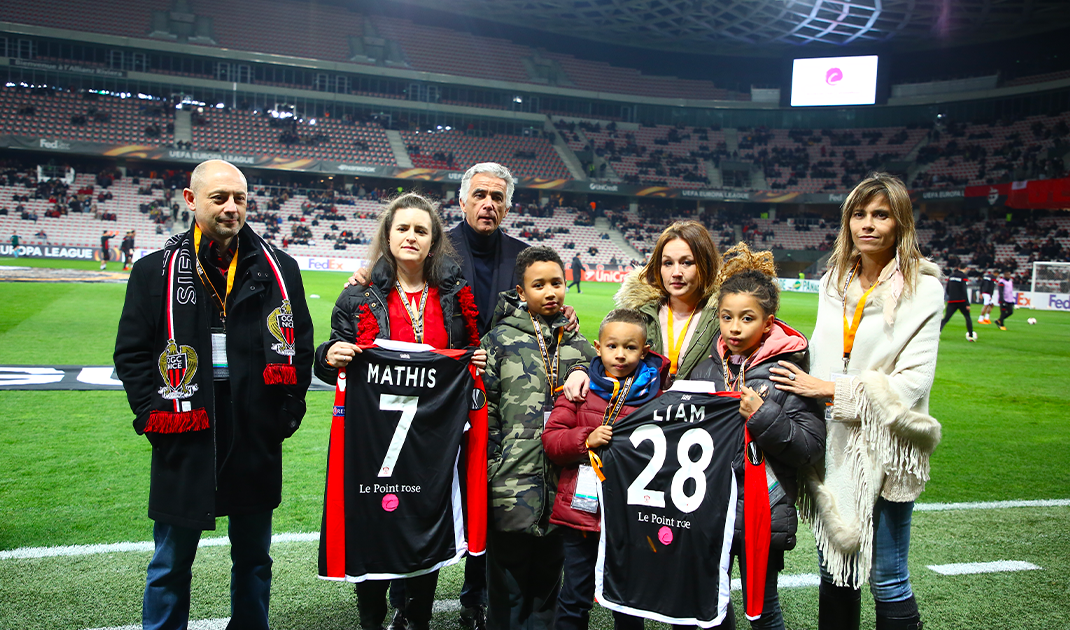
What are the results of your six years of work?
We have supported nearly 300 families. After a year, sometimes more, sometimes less, some don't need us any more, they've found their way and that's really our goal. Others keep a link with us. Those families also help us, help other families and make themselves available to suffering parents. What's new today is that we are increasingly contacted by parents whose child has a serious illness, one that is making them face up to potentially losing the child. We support them through the weeks or months of their child's illness. That something which we had been doing less, and has brought us closer to children's hospitals and the healthcare professionals with which we work. Those families seem to have come through that period better, that they have a bit more strength than others on that same very austere, very sad path. The extra-medical support can have a real impact. I believe that the more we support a family, the more we increase their resilience. We offer families meetings, conferences, lectures, therapies, anything that can help them live through those final times in the life of their child. And avoiding as much the avoidable suffering, which would add to that of seeing their child die, to enable them to experience moments of pure love with their child.
How did the partnership between Le Point rose and OGC Nice come about?
Less than a year after the launch of the association, Virginie Rossetti (OGC Nice's Communication and Brand Director), whom I knew from my professional life, called me to propose that Le Point rose appear on the club's European shirts. She had read in the UEFA regulations that it was possible to put a logo on the back if it was a charity. I was touched because she had asked us that, without us asking the club, and also that she had looked to see if it was possible to support our cause. Having myself worked in football, I know it is one of the biggest media forces in reaching a wider audience, to get a cause known, whatever it may be. The impact was huge because for each European game, the logo appeared on the shirt, and every time our ambassador, Yoan Cardinale, spoke, it was amazing, dozens of families contacted us. Through football, which is about celebration, sport, health, we were able to help dozens of families and give them hope in life.
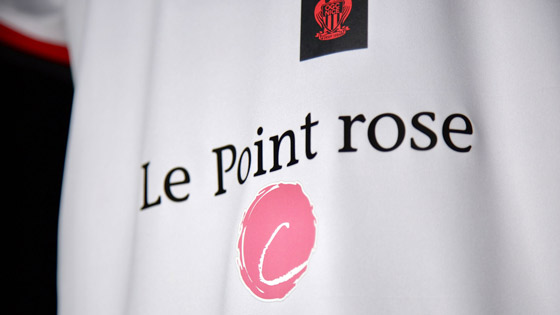
The Club has worked with you for five years now.
We were so proud to be on the Club's European shirt. Also, at each game, the Club paid tribute to a child who had passed away…It was a nice touch. But at the same time, we don't have to wait for that to work together and use what the Club can contribute. Throughout the seasons, we organise 'aprèm Chamallow' (Marshmallow afternoons), nice moments that we share with OGC Nice and its players. The Club has done a huge amount for ill children in working with hospitals and we also want to develop independent initiatives to help families in Nice and the region who have an ill child or who are grieving. We have some great projects to come with OGC Nice.
Can you present some of the projects the association is working on?
On 8 December, we're going to launch 'The red-and-black family evenings' at the OGC Nice Training Centre and Youth Academy. The aim is to give parents a space where they can speak and vent their feelings. We do a lot for children, but we also want to offer a nice place for parents to exchange once a month outside the hospital to give them a break. Without it being too far away so as not to leave their child too long if they are hospitalised. A big thank you, once again, to the Club for opening its doors to us.
There is also a refuge in the pipeline. Can you explain what that is?
This project will be based at Istres and will welcome children and families from across France. It's a place of respite for families whose child has a terminal illness and who must prepare to live differently, to 'add life to your days when you cannot add days to your life,' as they say. It's also a place where they can come afterwards and work on that bond with their child differetly. It's a 27-hectare site with different buildings with art-therapy, sport, treatment, meetings with others parents, there's a building dedicated to welcoming the children…In the existing structures, it's an extra string to our bow. There's hospital, there's home, but sometimes neither one is well suited. To have an alternative place to go, to watch the sunrise and sunset, to have animals, nature, that's going to bring another dimension other than medical. That's what this place can bring. The Domaine de Conclué should be ready in two years.
TODIBO THE ASSOCIATION'S NEW AMBASSDOR
Jean-Clair Todibo has taken on the role from Yoan Cardinale. "I want to thank Jean-Clair Todibo. We're convinced that Jean-Clair has all the qualities to represent us. I know Yoan Cardinale will stay close to Le Point rose and will continue to support us in our daily struggle. It's important for us to keep that link. I want to thank them from the bottom of my heart for their commitment," said Nathalie Paoli. "It's a cause you really have to carry in your heart and I understand some cannot, because it's a very difficult subject. Speaking with families about their child, about their pain and their story is not easy. The player has to feel they can do it and when they do it from their heart, it's magical."
'HAND IN HAND'
Virginie Rossetti, OGC Nice's Communication and Brand Director: "It's been six years now that we've gone forward hand-in-hand with Le Point rose. Our link is very strong. The association has an essential cause and we're proud to offer them what long-term support we can. Among the numerous projects to come, we'll launch the 'The red-and-black family evenings' on 8 December, which will enable families to meet once a month at the Club. Jean-Clair Todibo is taking over the role from Yoan Cardinale of Point rose ambassador, and will do so with just as much heart, authenticity and dedication."
PRESenTS FOR CHILDREN IN THE ARCHET HOSPITAL
Through the partnership with OGC Nice, its Endowment Fund and the Le Point rose association, Virginie Rossetti and Nathalie Paoli went to the Archet hospital on 25 October to meet hospitalised children and give them school kits from the 'Elise Princesse Courageuse' association.
